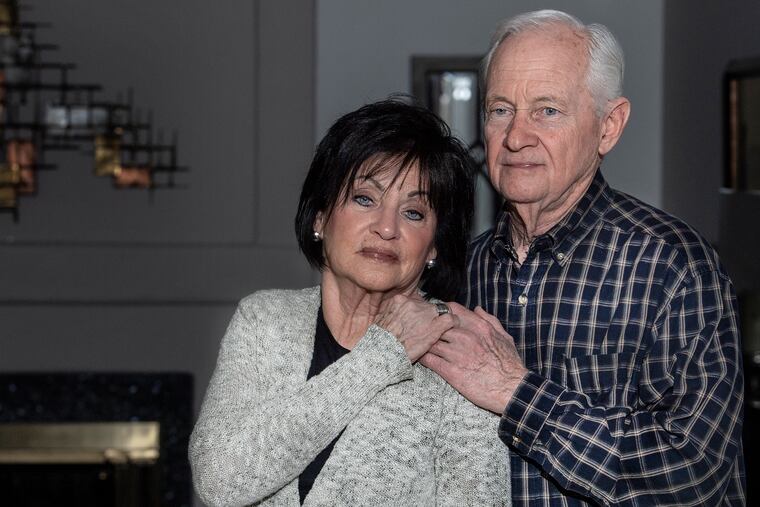A family’s push to change Pennsylvania’s DUI law seemed like an easy win. But it died a slow death in Harrisburg.
“Deana’s Law,” named after a woman killed by a six-time DUI driver, was watered down by amendments and other changes before its final defeat last month.

When Roseann and Richard DeRosa sat down for their Thanksgiving dinner in Brookhaven last month, it was difficult for them to be truly thankful. Not after the news they had received a week before.
After months of negotiations, deals, and meetings in Harrisburg, Senate Bill 773 — named “Deana’s Law” after their 45-year-old daughter, who was killed in February 2019 — failed in the House on Nov. 20. To the family, the legislation was a commonsense reform, issuing stricter penalties on chronic drunk drivers — like David Strowhouer, who caused Deana Eckman’s death in his sixth DUI in nine years.
But as it wound its way through the legislative process, Deana’s Law was altered and amended by lawmakers pushing their own agendas, with lobbyist support waxing and waning until the measure reached its ultimate defeat.
In the DeRosas’ view, the legislature failed their daughter. But they have no plans to end their push for change.
“If they can’t look at this law and see that it’s a good, solid way to save lives in Pennsylvania, there is definitely something wrong with them,” Roseann DeRosa said in an interview last month.
Deana’s Law was introduced in August 2019 by State Sen. Tom Killion, a Delaware County Republican who lost his reelection bid two weeks before the bill was defeated.
Because the Pennsylvania legislature meets in two-year sessions, bills that get voted down at the end of one session, like Deana’s Law, have to be reintroduced at the start of the next and begin the process anew.
» READ MORE: A new bill, inspired by a Delco woman’s death, aims to crack down on Pa.’s repeat DUI drivers
The bill would have changed the state’s Vehicle Code so drivers convicted of a third DUI would have to serve their sentences consecutively, and it would have increased the mandatory minimum sentences for fourth and fifth DUI convictions. The provisions are especially meaningful for the DeRosas: If Strowhouer had been required to serve his sentences consecutively, he wouldn’t have been out of prison, and able to drive, on the day he killed Eckman.
Her namesake law also would have required statewide use of “continuous alcohol monitoring” anklets to detect the wearer’s blood-alcohol content.
Killion drafted the measure with input from the state police, AAA, and the state Department of Transportation, and the bill easily passed the Senate. But it bogged down in the House, with other lawmakers introducing amendments, including one that carved out an exemption in the DUI law for medical marijuana patients, and another concerning how suspended licenses are renewed.
“After we got it out of the Senate, I congratulated Roseann, and told her we were going to save lives,” Killion said. “But it was end of session, when people are trying to get their ideas through, and my bill became a vehicle for other issues.”
The amendment for medical marijuana lost Killion the support of AAA, which he said was “a major monkey wrench.”
State Rep. Mike Carroll (D., Luzerne), the amendment’s sponsor, disputed that characterization and said there was wide support for it among his colleagues, although it was eventually removed from the bill.
» READ MORE: Five DUI convictions, then a fatal crash. Now, a Delco mother is left to grieve — and rage.
Subsequent versions of the measure proposed to make a driver’s third DUI a felony, a proposal gun-rights supporters opposed because it would limit access to firearms.
Some Democratic lawmakers, including State Sen. Sharif Street of Philadelphia, saw the bill and its enhanced penalties for DUI offenses as counter to criminal justice reform.
The state’s chapter of the ACLU joined in opposition to the measure and became a vocal critic. Elizabeth Randol, the legislative director of the local ACLU, said Deana’s Law added unnecessary and redundant penalties for DUI offenses. And while she empathizes with the DeRosas and their mission to prevent other deaths, she said the proposal they backed would take away judges’ discretion to hand down appropriate sentences.
» READ MORE: In his sixth DUI, Chester County man pleads guilty to killing woman in head-on crash
The bill the DeRosas hoped would one day become Deana’s Law was defeated 151-51 in the House last month.
Killion, who leaves office in January, was disappointed, but remains hopeful that a recrafted bill may yet succeed.
“I’ve had conversations with my colleagues to keep this thing going and push it through next session,” he said.
Roseann and Richard DeRosa hold on to that same hope. They are committed to seeing this through to the end, and they promise not to give up until the legislation makes it way to the governor’s desk.
“We’re reliving the nightmare of that night over and over again,” Roseann DeRosa said. “Between that, and knowing that we could prevent other people from going through this, we won’t stop.”